The Ministry of Interior (under which falls the National Roma Contact Point, NRCP) was represented by Dr. László Felkai, State Secretary, and Dr. László Ulicska, of the Deputy State Secretariat for Social Inclusion, and the Ministry of Human Capacities by Zoltán Lengyel, of the State Secretariat for European Union Development Policy (MA).
This meeting took place after the European elections and the subsequent changes in the European Parliament (EP) as well as the imminent renewal of the European Commission (EC). In this new scenario, discussions on the future of the EU Framework for NRIS and of the ESI Funds Framework, including ESF+ and ERDF Regulations, resumed and entered the final phase. Against this background, the future of the policy and financial frameworks remained core issues of the meeting’s agenda.
Mr. Fresno focused on the main elements and the pros and cons of the six potential policy options for a future EU action that are being considered in the context of the EC’s ex-ante impact assessment as well as the proposal for a country differentiation. Based on the input gathered up to now, it seems that there is a general consensus that there should be an action at EU and national level and that more should be done. A mentioned was also made to the paper prepared by the European Agency for Fundamental Rights (FRA) with suggestions for an indicator framework to measure progress on Roma inclusion post-2020.
EURoma’s document of proposals for an EU Framework for Roma equality and inclusion
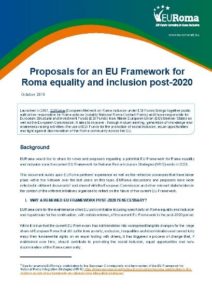 Partners reviewed the main elements of the document of proposals for the post-2020 EU action for Roma equality and inclusion elaborated by the EURoma Network to contribute to the current process of reflection, following the ‘Assessment of the mid-term review of the EU Framework for National Roma Integration Strategies up to 2020’ released in 2018. The document recalls why a renewed EU Framework is necessary and puts forward proposals on how it could be reformed to consider the lessons learnt during the implementation of the current EU Framework (achievements and challenges) and the changes in the social and political context since its adoption in 2011.
Partners reviewed the main elements of the document of proposals for the post-2020 EU action for Roma equality and inclusion elaborated by the EURoma Network to contribute to the current process of reflection, following the ‘Assessment of the mid-term review of the EU Framework for National Roma Integration Strategies up to 2020’ released in 2018. The document recalls why a renewed EU Framework is necessary and puts forward proposals on how it could be reformed to consider the lessons learnt during the implementation of the current EU Framework (achievements and challenges) and the changes in the social and political context since its adoption in 2011.
Finally, it analyses how to best connect the EU Framework/NRIS with ESI Funds as key financial and political instruments to promote Roma inclusion and to meet the objectives of the future EU action and National Strategies. To this end, it is essential to maintain the recognition of the role of ESI Funds (mainly ESF+ and ERDF-CF but also other funds) in the post-2020 EU action/National Strategies and to reinforce the alignment, complementarity and coordination between these two instruments, connecting the financial and the policy sides.
Post-2020 Multiannual Financial Framework (MFF) and Roma inclusion
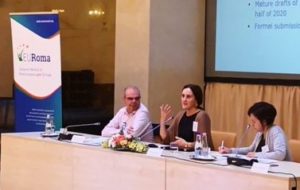 Teresa Epalza, European Commission’s DG for Employment, Social Affairs and Inclusion (DG EMPL) (ESF and FEAD: Policy and Legislation) updated participants on the latest developments and next steps as regards the negotiations on the cohesion policy package taking place between the Euroepan Comission, the European Parliament and the European Council and programming process that is taking place informally between the EC and MS in parallel with the formal negotiations. Particular attention was paid to the ESF+ and ERDF-CF.
Teresa Epalza, European Commission’s DG for Employment, Social Affairs and Inclusion (DG EMPL) (ESF and FEAD: Policy and Legislation) updated participants on the latest developments and next steps as regards the negotiations on the cohesion policy package taking place between the Euroepan Comission, the European Parliament and the European Council and programming process that is taking place informally between the EC and MS in parallel with the formal negotiations. Particular attention was paid to the ESF+ and ERDF-CF.
She also recalled the linkages between the MFF and the European Pillar of Social Rights and the importance given by the EC to promoting a closer link between policy and funding.
Updated EURoma position paper on European Social Fund+
The content of the EURoma position paper on ESF+ was presented and discussed among partners. This document is a revised version of the previous Network’s position paper on the matter (released in November 2018) to take into account the latest developments -notably European Parliament’s position on the Commission’s proposal as well as the discussions within the European Council.
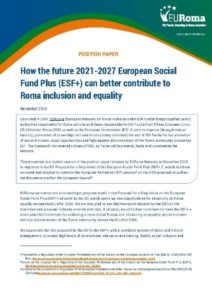 EURoma welcomes and acknowledges progress made in the EC’s proposal for a Regulation on the ESF+, which opens up new opportunities for advancing on Roma equality across the EU after 2020. We are also glad to see that the report adopted by the European Parliament on the Commission’s proposal and the discussions within the European Council include amendments that, if adopted, would further contribute to make the ESF+ a more powerful instrument for achieving a more social Europe and advancing on equality, social inclusion and non-discrimination of the Roma population across the EU after 2020. EURoma hopes that these changes are maintained in the trialogues between the institutions. EURoma is particularly satisfied with the maintenance of the explicit mention to Roma, a straightforward acknowledgement of the need for ESF+ to specifically address the unequal situation that Roma face across the EU and the need to reinforce investments due to limited impact.
EURoma welcomes and acknowledges progress made in the EC’s proposal for a Regulation on the ESF+, which opens up new opportunities for advancing on Roma equality across the EU after 2020. We are also glad to see that the report adopted by the European Parliament on the Commission’s proposal and the discussions within the European Council include amendments that, if adopted, would further contribute to make the ESF+ a more powerful instrument for achieving a more social Europe and advancing on equality, social inclusion and non-discrimination of the Roma population across the EU after 2020. EURoma hopes that these changes are maintained in the trialogues between the institutions. EURoma is particularly satisfied with the maintenance of the explicit mention to Roma, a straightforward acknowledgement of the need for ESF+ to specifically address the unequal situation that Roma face across the EU and the need to reinforce investments due to limited impact.
Despite these very important elements for progress within the ESF+ Regulation proposal, EURoma puts forward additional proposals on a number of aspects considered of relevance to improve the effectiveness of ESF+ for Roma inclusion.
EURoma position paper also makes reference to the ERDF-Cohesion Fund, key financial instruments to promote Roma inclusion, alongside the ESF+. EURoma particularly welcomes the different amendments included in the Parliament’s report on the EC’s proposal to contribute to better using the potential of these funds to promote equality, social inclusion and non-discrimination of all European citizens, including those groups experiencing or at risk of poverty, discrimination or social exclusion, and to address the situation of poverty that still affects many European citizens, among them many Roma.
Learnings from the meta-evaluation of interventions for Roma inclusion
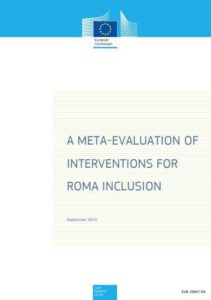 José Manuel Fresno (Fresno the right link) presented the main outcomes of the ‘Meta-evaluation of interventions for Roma inclusion’ recently published by the EC’s Joint Research Centre (JRC). The purpose of this meta-analysis of interventions for Roma inclusion (understood as policies, programmes and projects) was to establish a consolidated view of the outcomes of evaluations conducted and completed in the past, so as to condense knowledge on what works, what does not and why.
José Manuel Fresno (Fresno the right link) presented the main outcomes of the ‘Meta-evaluation of interventions for Roma inclusion’ recently published by the EC’s Joint Research Centre (JRC). The purpose of this meta-analysis of interventions for Roma inclusion (understood as policies, programmes and projects) was to establish a consolidated view of the outcomes of evaluations conducted and completed in the past, so as to condense knowledge on what works, what does not and why.
This evaluation includes learnings that are relevant for the planning, implementation, evaluation of EU funds and could be of relevance for the current process of planning of the post-2020 period on the one hand and for the evaluation of the current period on the other.
Other relevant developments
Information was shared on other relevant developments for ESI Funds and Roma inclusion, notably the public consultation on ESF support to social inclusion, fight against poverty and discrimination launched by the EC.
Looking at ESI Funds programming phase: setting the basis for successful Roma inclusion interventions
This meeting paid particular attention to the programming of Operational Programmes (OPs), as a key phase to set the basis for future effective interventions. To this end, in addition to involving the colleagues in charge of programming in the meeting, a specific session was devoted to this specific topic. This session aimed to promote a reflection on key elements to consider in the programming of the 2021-2027 period, based on the experience of the current period, notably the impact of the way Roma inclusion was planned in the implementation.
 The session started with a panel involving representatives of a selected number of partner countries, followed by discussion in working groups and plenary on specific topics raised. Partner countries involved in the reflection panel included: Bulgaria (Roberto Marinov, Human Resources Development OP MA, Ministry of Labour and Social Policy), Greece (Georgia Panagiotou, NRCP, General Secretariat of Social Solidarity and against Poverty, Ministry of Labour and Social Affairs General) and Spain (Miguel Crespo, ESF MA, Ministry of Labour, Migrations and Social Security). They were invited to reflect on three questions:
The session started with a panel involving representatives of a selected number of partner countries, followed by discussion in working groups and plenary on specific topics raised. Partner countries involved in the reflection panel included: Bulgaria (Roberto Marinov, Human Resources Development OP MA, Ministry of Labour and Social Policy), Greece (Georgia Panagiotou, NRCP, General Secretariat of Social Solidarity and against Poverty, Ministry of Labour and Social Affairs General) and Spain (Miguel Crespo, ESF MA, Ministry of Labour, Migrations and Social Security). They were invited to reflect on three questions:
- How was Roma inclusion considered in the 2014-2020 programming period (e.g. in the framework of the specific ESF IP or other ESF/ERDF priorities, in terms of approach (target/mainstreaming/territorial), scope (national/regional), length and scale of interventions, alignment with the policy framework…)
- Key programming elements for a successful implementation of programmes (what worked or not, challenges faced and possible solutions, lessons learnt…)
- Based on the learnings of the current period, elements that would be important to consider in the programming of the 2021-2027 period to promote that future interventions are effective and have impact.
Following their presentations, all partners were invited to reflect in working groups first and then in plenary on:
- The situation of ESI Funds programming in their respective countries;
- The key decisions to be taken at this point on how to address Roma equality and inclusion with the use of ESI Funds, including: selection of key investments: alignment with assessment needs and policy frameworks (European Semester -Annex D-, NRIS, other policy sectoral frameworks…); ESI Funds that will be involved (including combination of funds); use of specific objective on Roma versus use of other specific objectives; definition of national/regional OPs; target/mainstreaming approaches in OPs; key actors to engage in the planning process.
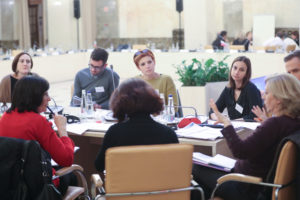
EURoma Network activities and products
Partners reviewed activities undertaken or planned by EURoma Network in the framework of its three lines of intervention:
- Mutual learning and sharing of knowledge and experience among partners. In addition to the Management Committee meetings, regular actions to promote bilateral and multilateral exchange and cooperation between partners and between partners and external actors are promoted.
- Generation of knowledge on key aspects related to the use of ESI Funds for Roma inclusion: elaboration of the position papers of proposals for a future EU Framework for Roma equality and inclusion and for the post-2020 ESF+, EURoma Network updates (i.e. electronic newsletters, news alerts/flash updates) on relevant developments as regards Roma policies and ESI Funds and on Network activities and products.
- Presence in relevant fora and initiatives of European institutions and organisations in connection with ESI Funds and Roma inclusion.
For further information on EURoma activities, please check EURoma website
Country monograph: Looking at the Hungarian case
The second day of the meeting was devoted to gaining a better insight of the Hungarian context as regards Roma inclusion, further to the initial ideas shared in the welcome and opening remarks. Hungarian partners presented more detailed information on the situation of Roma and how policies and ESI Funds are addressing it, including initiatives related to ESI Funds funding.
General overview of the Hungarian case
On behalf of the NRCP (Ministry of Interior, Deputy State Secretariat for Social Inclusion), Iván Sörös provided an overview of the Roma population in Hungary and its situation. He then referred to the main policy document related to Roma inclusion – the Hungarian National Social Inclusion Strategy-, which is conceived as the country’s NRIS and as anti-poverty strategy.
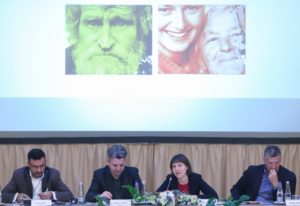 Zsófia Batta, Head of Department of the Secretariat of the Prime Minister Commissioner for Roma Affairs and Szilárd Lantos, Programme Manager of the Hungarian Charity Service of the Order of Malta presented an initiative currently being implemented to face the challenge of high territorial concentration of social problems by addressing the situation of the most disadvantaged rural settlements (with overrepresentation of Roma): the diagnosis-based social national strategy for the inclusion of Roma people.
Zsófia Batta, Head of Department of the Secretariat of the Prime Minister Commissioner for Roma Affairs and Szilárd Lantos, Programme Manager of the Hungarian Charity Service of the Order of Malta presented an initiative currently being implemented to face the challenge of high territorial concentration of social problems by addressing the situation of the most disadvantaged rural settlements (with overrepresentation of Roma): the diagnosis-based social national strategy for the inclusion of Roma people.
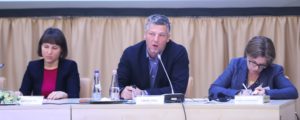 Gábor Veres, of the State Secretariat for EU Development Policy of the Ministry of Human Capacities, shared information on how ESI Funds are contributing to the implementation of the actions planned in the National Social Inclusion Strategy. He particularly focused on the Human Resources Development OP (HRDOP) that the Ministry manages and that is one of the most relevant OPs for Roma inclusion in Hungary.
Gábor Veres, of the State Secretariat for EU Development Policy of the Ministry of Human Capacities, shared information on how ESI Funds are contributing to the implementation of the actions planned in the National Social Inclusion Strategy. He particularly focused on the Human Resources Development OP (HRDOP) that the Ministry manages and that is one of the most relevant OPs for Roma inclusion in Hungary.
ESI Funds funded initiatives: identifying elements for successful investments
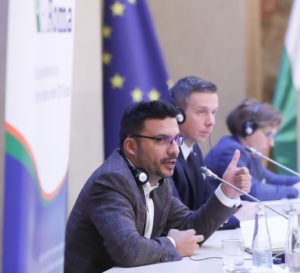 Following the presentation of the general context, a number of initiatives, funded by ESI Funds and national sources, were presented with the aim of promoting the exchange of experiences among network partners and identifying elements of success for interventions with Roma.
Following the presentation of the general context, a number of initiatives, funded by ESI Funds and national sources, were presented with the aim of promoting the exchange of experiences among network partners and identifying elements of success for interventions with Roma.
Ivan Sörös, of the Ministry of Interior, presented a number of initiatives that started as pilot projects with ESF or ERDF funding and have then been included in national mainstream policies and funding mechanisms. They address two crucial and challenging elements to promote an effective use of funds: the sustainability of interventions beyond project funding (or in-between funding periods) and the scaling up and continuity of practices that prove to be efficient. Initiatives presented included the Sure Start Children’s Houses, the ‘TANODA’ Study Halls and the Roma boarding schools.
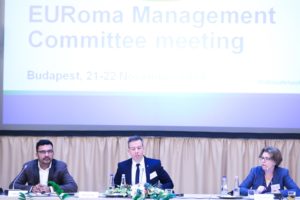 Ákos Molnár, of the Ministry of Finance, focused on the actions related to the interventions related to seggregated urban areas based on the experience of two regional OPs -Territorial and Settlement Development OP (TSDOP) and Competitive Central Hungary OP (CCHOP)-, which complement the territorial coverage and the support provided through the HRDOP previously presented.
Ákos Molnár, of the Ministry of Finance, focused on the actions related to the interventions related to seggregated urban areas based on the experience of two regional OPs -Territorial and Settlement Development OP (TSDOP) and Competitive Central Hungary OP (CCHOP)-, which complement the territorial coverage and the support provided through the HRDOP previously presented.
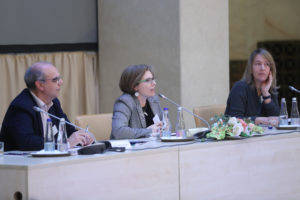 Dora Husz, of the Unit in charge of Roma coordination within the European Commission (DG Justice and Consumers, DG JUST) and José Manuel Fresno, independent expert collaborating with the EC (Fresno Consulting), were in charge of presenting the general context and main elements of the discussions on the future of the current EU Framework for NRIS once it comes to an end in 2020. Particular attention was paid to the connection between this policy framework and ESI Funds, notably in the context of the preparation of the future funds programming documents and the enabling conditions.
Dora Husz, of the Unit in charge of Roma coordination within the European Commission (DG Justice and Consumers, DG JUST) and José Manuel Fresno, independent expert collaborating with the EC (Fresno Consulting), were in charge of presenting the general context and main elements of the discussions on the future of the current EU Framework for NRIS once it comes to an end in 2020. Particular attention was paid to the connection between this policy framework and ESI Funds, notably in the context of the preparation of the future funds programming documents and the enabling conditions.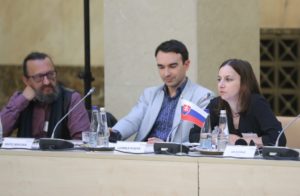 ferent policy options proposed and the elements featured in each of them to best address current weaknesses and challenges
ferent policy options proposed and the elements featured in each of them to best address current weaknesses and challenges
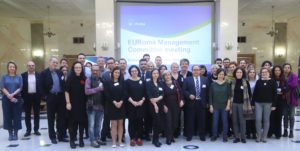
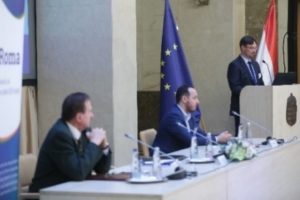 Representatives of the Hungarian Network partner organisations were in charge of welcoming participants and of sharing some initial ideas on the Hungarian context as regards the situation of Roma and how policies and ESI Funds are contributing to their inclusion (for further information, see ‘Country monograph’).
Representatives of the Hungarian Network partner organisations were in charge of welcoming participants and of sharing some initial ideas on the Hungarian context as regards the situation of Roma and how policies and ESI Funds are contributing to their inclusion (for further information, see ‘Country monograph’). Partners reviewed the main elements of the document of proposals for the post-2020 EU action for Roma equality and inclusion elaborated by the EURoma Network to contribute to the current process of reflection, following the ‘
Partners reviewed the main elements of the document of proposals for the post-2020 EU action for Roma equality and inclusion elaborated by the EURoma Network to contribute to the current process of reflection, following the ‘ Teresa Epalza, European Commission’s DG for Employment, Social Affairs and Inclusion (DG EMPL) (ESF and FEAD: Policy and Legislation) updated participants on the latest developments and next steps as regards the negotiations on the cohesion policy package taking place between the Euroepan Comission, the European Parliament and the European Council and programming process that is taking place informally between the EC and MS in parallel with the formal negotiations. Particular attention was paid to the ESF+ and ERDF-CF.
Teresa Epalza, European Commission’s DG for Employment, Social Affairs and Inclusion (DG EMPL) (ESF and FEAD: Policy and Legislation) updated participants on the latest developments and next steps as regards the negotiations on the cohesion policy package taking place between the Euroepan Comission, the European Parliament and the European Council and programming process that is taking place informally between the EC and MS in parallel with the formal negotiations. Particular attention was paid to the ESF+ and ERDF-CF. EURoma welcomes and acknowledges progress made in the EC’s proposal for a Regulation on the ESF+, which opens up new opportunities for advancing on Roma equality across the EU after 2020. We are also glad to see that the report adopted by the European Parliament on the Commission’s proposal and the discussions within the European Council include amendments that, if adopted, would further contribute to make the ESF+ a more powerful instrument for achieving a more social Europe and advancing on equality, social inclusion and non-discrimination of the Roma population across the EU after 2020. EURoma hopes that these changes are maintained in the trialogues between the institutions. EURoma is particularly satisfied with the maintenance of the explicit mention to Roma, a straightforward acknowledgement of the need for ESF+ to specifically address the unequal situation that Roma face across the EU and the need to reinforce investments due to limited impact.
EURoma welcomes and acknowledges progress made in the EC’s proposal for a Regulation on the ESF+, which opens up new opportunities for advancing on Roma equality across the EU after 2020. We are also glad to see that the report adopted by the European Parliament on the Commission’s proposal and the discussions within the European Council include amendments that, if adopted, would further contribute to make the ESF+ a more powerful instrument for achieving a more social Europe and advancing on equality, social inclusion and non-discrimination of the Roma population across the EU after 2020. EURoma hopes that these changes are maintained in the trialogues between the institutions. EURoma is particularly satisfied with the maintenance of the explicit mention to Roma, a straightforward acknowledgement of the need for ESF+ to specifically address the unequal situation that Roma face across the EU and the need to reinforce investments due to limited impact. José Manuel Fresno (Fresno the right link) presented the main outcomes of the ‘Meta-evaluation of interventions for Roma inclusion’ recently published by the EC’s Joint Research Centre (JRC). The purpose of this meta-analysis of interventions for Roma inclusion (understood as policies, programmes and projects) was to establish a consolidated view of the outcomes of evaluations conducted and completed in the past, so as to condense knowledge on what works, what does not and why.
José Manuel Fresno (Fresno the right link) presented the main outcomes of the ‘Meta-evaluation of interventions for Roma inclusion’ recently published by the EC’s Joint Research Centre (JRC). The purpose of this meta-analysis of interventions for Roma inclusion (understood as policies, programmes and projects) was to establish a consolidated view of the outcomes of evaluations conducted and completed in the past, so as to condense knowledge on what works, what does not and why. The session started with a panel involving representatives of a selected number of partner countries, followed by discussion in working groups and plenary on specific topics raised. Partner countries involved in the reflection panel included: Bulgaria (Roberto Marinov, Human Resources Development OP MA, Ministry of Labour and Social Policy), Greece (Georgia Panagiotou, NRCP, General Secretariat of Social Solidarity and against Poverty, Ministry of Labour and Social Affairs General) and Spain (Miguel Crespo, ESF MA, Ministry of Labour, Migrations and Social Security). They were invited to reflect on three questions:
The session started with a panel involving representatives of a selected number of partner countries, followed by discussion in working groups and plenary on specific topics raised. Partner countries involved in the reflection panel included: Bulgaria (Roberto Marinov, Human Resources Development OP MA, Ministry of Labour and Social Policy), Greece (Georgia Panagiotou, NRCP, General Secretariat of Social Solidarity and against Poverty, Ministry of Labour and Social Affairs General) and Spain (Miguel Crespo, ESF MA, Ministry of Labour, Migrations and Social Security). They were invited to reflect on three questions:
 Zsófia Batta, Head of Department of the Secretariat of the Prime Minister Commissioner for Roma Affairs and Szilárd Lantos, Programme Manager of the Hungarian Charity Service of the Order of Malta presented an initiative currently being implemented to face the challenge of high territorial concentration of social problems by addressing the situation of the most disadvantaged rural settlements (with overrepresentation of Roma): the diagnosis-based social national strategy for the inclusion of Roma people.
Zsófia Batta, Head of Department of the Secretariat of the Prime Minister Commissioner for Roma Affairs and Szilárd Lantos, Programme Manager of the Hungarian Charity Service of the Order of Malta presented an initiative currently being implemented to face the challenge of high territorial concentration of social problems by addressing the situation of the most disadvantaged rural settlements (with overrepresentation of Roma): the diagnosis-based social national strategy for the inclusion of Roma people. Gábor Veres, of the State Secretariat for EU Development Policy of the Ministry of Human Capacities, shared information on how ESI Funds are contributing to the implementation of the actions planned in the National Social Inclusion Strategy. He particularly focused on the Human Resources Development OP (HRDOP) that the Ministry manages and that is one of the most relevant OPs for Roma inclusion in Hungary.
Gábor Veres, of the State Secretariat for EU Development Policy of the Ministry of Human Capacities, shared information on how ESI Funds are contributing to the implementation of the actions planned in the National Social Inclusion Strategy. He particularly focused on the Human Resources Development OP (HRDOP) that the Ministry manages and that is one of the most relevant OPs for Roma inclusion in Hungary. Following the presentation of the general context, a number of initiatives, funded by ESI Funds and national sources, were presented with the aim of promoting the exchange of experiences among network partners and identifying elements of success for interventions with Roma.
Following the presentation of the general context, a number of initiatives, funded by ESI Funds and national sources, were presented with the aim of promoting the exchange of experiences among network partners and identifying elements of success for interventions with Roma. Ákos Molnár, of the Ministry of Finance, focused on the actions related to the interventions related to seggregated urban areas based on the experience of two regional OPs -Territorial and Settlement Development OP (TSDOP) and Competitive Central Hungary OP (CCHOP)-, which complement the territorial coverage and the support provided through the HRDOP previously presented.
Ákos Molnár, of the Ministry of Finance, focused on the actions related to the interventions related to seggregated urban areas based on the experience of two regional OPs -Territorial and Settlement Development OP (TSDOP) and Competitive Central Hungary OP (CCHOP)-, which complement the territorial coverage and the support provided through the HRDOP previously presented.